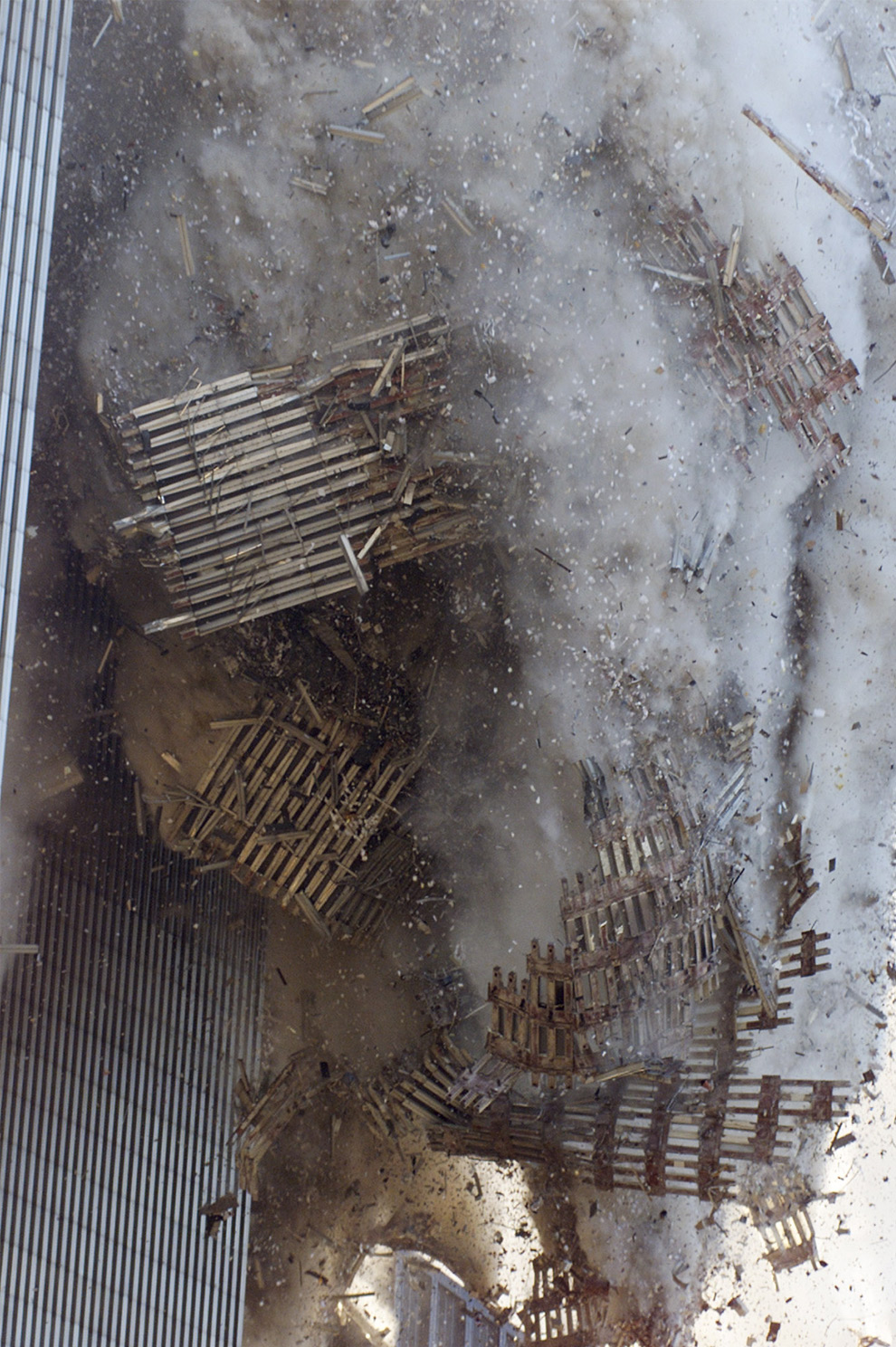The Daily Escape:

Remembrance of an Idealized WTC. (This is a 2015 screen grab from The Economist)
On this 20th anniversary of the 9/11 disaster, let’s take a short look back, and a longer look forward.
Wrongo and Ms. Right lived 2 blocks from the WTC in the early 1980s. We were urban pioneers, living and working in the Wall Street area. That part of town didn’t have supermarkets, and few stores were open after 5pm.
Occasionally, we would have dinner at Windows on the World, the restaurant at the top of the North Tower. In fact, one of our children had her sweet-sixteen dinner there, with all of New York at her feet. Back then, I visited the Towers often, seeing friends and colleagues who worked there.
On 9/11/2001, Wrongo was in Maine, visiting a company he had just acquired. Like in Manhattan, we watched a beautiful blue sky as the terrible breaking news turned into harsh reality. We spent the next week vainly trying to work, while mostly sitting in a nearby restaurant with a huge TV wall that was tuned in to all terrorism, all the time.
We had a grandson born in New Jersey on 9/14. I drove to the hospital from Augusta, Maine, while Ms. Right drove east from State College, PA. He’s turning 20.
Today, it gets progressively harder to remember what the US used to be like before 9/11. We forget what it was like to be able to arrive at the airport 20 minutes before a flight. What it was like to walk into a building without going through a metal detector.
Most important, it’s hard to remember what it was like to believe that the US’s version of democracy would remain ascendant for all time. Some context for our 20-year War on Terror comes from Spencer Ackerman’s 2021 book, “Reign of Terror”:
“In response to 9/11, America had invaded and occupied two countries, bombed four others for years, killed at least 801,000 people — a full total may never be known — terrified millions more, tortured hundreds, detained thousands, reserved unto itself the right to create a global surveillance dragnet, disposed of its veterans with cruel indifference, called an entire global religion criminal or treated it that way, made migration into a crime and declared most of its actions to be either legal or constitutional. It created at least 21 million refugees and spent as much as $6 trillion on its operations.”
Quite the achievement, no? We responded in a primitive, unthinking way and unearthed a weakness in our national character that continues to haunt us today. Among 9/11’s legacies are not just mass surveillance and drone strikes, but also the rise of right-wing extremism. More from Ackerman:
“When terrorism was white….America sympathized with principled objections against unleashing the coercive, punitive, and violent powers of the state….When terrorism was white, the prospect of criminalizing a large swath of Americans was unthinkable…”
He’s thinking about the Oklahoma City bombing. Then things changed:
“The result…was a vague definition of an enemy that consisted of thousands of Muslims, perhaps millions, but not all Muslims — though definitely, exclusively, Muslims.”
It’s important to remember that GW Bush insisted that Muslims weren’t the enemy at one moment and then described the War on Terror as a “crusade” the next.
Many authors say there’s a direct line between 9/11 and the rise of right-wing extremism in the US. For example, the Ground Zero Mosque enraged Republicans. The buildings, a few blocks from the WTC, were damaged on 9/11. In 2009, the NYT reported on plans to replace some of the buildings with a mosque and Islamic cultural center. Republicans were still angry enough to complain that the new building was a “victory mosque”.
It is one thing to oppose radical Islamist terrorism. But when Republican politicians redefined the enemy not as violent jihadists but Muslims in general, they also redefined their Party as one welcoming xenophobic rhetoric and candidates.
From Cynthia Miller-Idress:
“…al Qaeda terrorists and their ilk seemed to have stepped out of a far-right fever dream. Almost overnight, the US…abounded with precisely the fears that the far right had been trying to stoke for decades…far-right groups saw an opportunity and grabbed it, quickly and easily adapting their messages to the new landscape. A well-resourced Islamophobia industry sprang into action, using a variety of scare tactics to generate hysteria about the looming threat.”
Will Saletan of Slate connects this to our botched Covid response:
“When al-Qaida struck America on 9/11, Republicans completely reoriented our government to confront terrorism….Republicans instituted new measures to track and halt the spread of terrorism at home. They upgraded domestic surveillance and tightened screening at airports and other public places.
Today, in the face of a far more deadly enemy, Republicans have done the opposite. They’ve belittled the coronavirus pandemic, scorned vigilance, defended reckless individualism, and obstructed efforts to protect the public.”
Their campaign of obstruction and propaganda has contributed to millions of unnecessary infections.
In this respect, Covid was a test of that Party’s character. It challenged Republicans to decide whether they’ve moved from being a party of national security, to a party of grievance and animosity. We now know the answer to that question.
Elliot Ackerman (no relation) in Foreign Affairs observes:
“From Caesar’s Rome to Napoleon’s France, history shows that when a republic couples a large standing military with dysfunctional domestic politics, democracy doesn’t last long. The US today meets both conditions.”
Let’s close with a 9/11 tune. The October 20, 2001 “Concert for New York” can’t be beat. It was a highly visible and early part of NYC’s healing process.
One of the many highlights of that 4+hour show was Billy Joel’s medley of “Miami 2017 (seen the lights go out on Broadway)” and his “New York State of Mind”. Joel wrote “Miami 2017” in 1975, at the height of the NYC fiscal crisis. It describes an apocalyptic fantasy of a ruined NY that got a new, emotional second life after he performed it during the Concert for New York:
The concert brought a sense of human bonding in a time of duress. It isn’t hyperbole to say that the city began its psychological recovery that night in Madison Square Garden. It’s worth your time.


